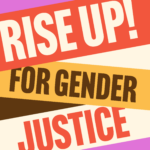
By Marie Clarke Walker
The numbers are staggering.
More than 800 million women globally have experienced some form of violence and harassment, ranging from physical assault to verbal abuse, bullying and intimidation, according to the International Trade Union Confederation.
Here in Canada, a 2018 Angus Reid study found that 1 in 2 women reported experiencing sexual harassment in the workplace. Two-thirds of women told pollsters that they were personally impacted by the #MeToo movement.
Indeed, #MeToo and similar movements have helped expose the scale of the problem in the world of work, encouraging women to speak out and demand justice. While women are overwhelmingly and disproportionately affected, men are not immune. And discrimination against certain groups exacerbates violence and harassment.
A study by Canada’s federal government found that 94% of complaints of sexual harassment in federal workplaces were made by women. The study found that women with disabilities or who were a member of a visible minority were more likely to experience harassment.
In response to the overwhelming evidence of this phenomenon, the federal government passed Bill C-65 last year with the input of unions and employers. The legislation focuses on prevention, effective responses and support for affected employees.
This was an important step. However, no sector, whether formal or informal, public, private or voluntary is immune to this scourge. There are far too many workplaces in which workers are continuously at risk, with few safeguards or supports. This is one of the main reasons Canada’s unions launched a campaign called #DoneWaiting in 2018, which includes a call to end violence and sexual harassment at work.
In particular, higher rates of violence and harassment are consistently recorded in sectors such as transport, health and social care, hotel and restaurant, media and entertainment, agriculture, and in domestic work. Violence and harassment at work can come from managers, supervisors, co-workers, customers and clients. Furthermore, research conducted by the Canadian Labour Congress (CLC) and the University of Western Ontario found that 1 in 3 workers have experienced domestic violence, another form of violence that can impact them at work.
It can happen at the physical workplace, at work-related social events or training, while getting to and from work, or anywhere the worker is required to be because of her or his work. Abusive workplace practices can also contribute to the toll of violence and harassment, with work-related stress and mental illness at an all-time high.
There is a window of opportunity to take decisive action to hold employers accountable, across sectors.
This month, the International Labour Organization (ILO), the United Nations (UN) agency responsible for setting global legal standards for working conditions, will complete negotiations on a new law to prohibit, prevent and remedy violence and harassment. The aim is to ratify a global treaty during the ILO’s centenary conference taking place between June 10-21.
If the negotiations are successful, the new international law will place clear responsibilities on employers and governments for tackling violence and harassment in the world of work. Workers, too, will have responsibilities to refrain from acts of violence and harassment and to comply with any policies, procedures or other steps taken by their employers to prevent it.
While there are differences to settle on the final content of the new law, there is broad support for its adoption amongst trade unions, governments and some employers.
Negotiations with companies include introducing or strengthening measures like paid leave for victims of domestic violence, providing easy access to information, advice or counselling, and flexible working hours to minimise the risk of stalking by violent ex-partners.
Violence and harassment in the world of work is a global problem, requiring global solutions.
The negotiations at the ILO are timely, not least, as the UN agency celebrates 100 years of its existence this year. Trade unions were campaigning for this new law long before the painful revelations of #MeToo. Our government and employers must now play their part in making this a reality.
No one should go to work fearing for their safety and well-being.
Marie Clarke Walker is the Secretary-Treasurer of the CLC.


